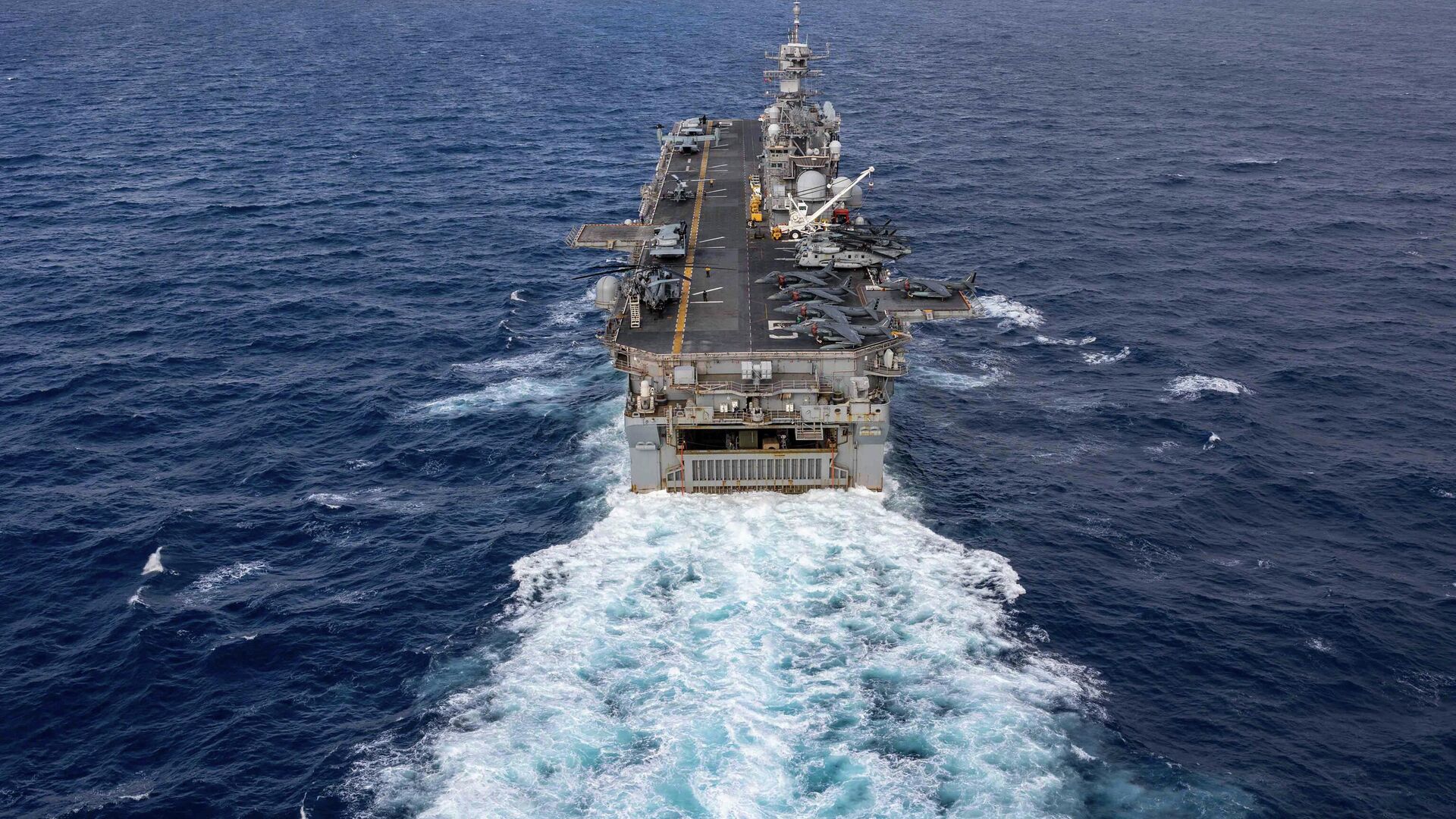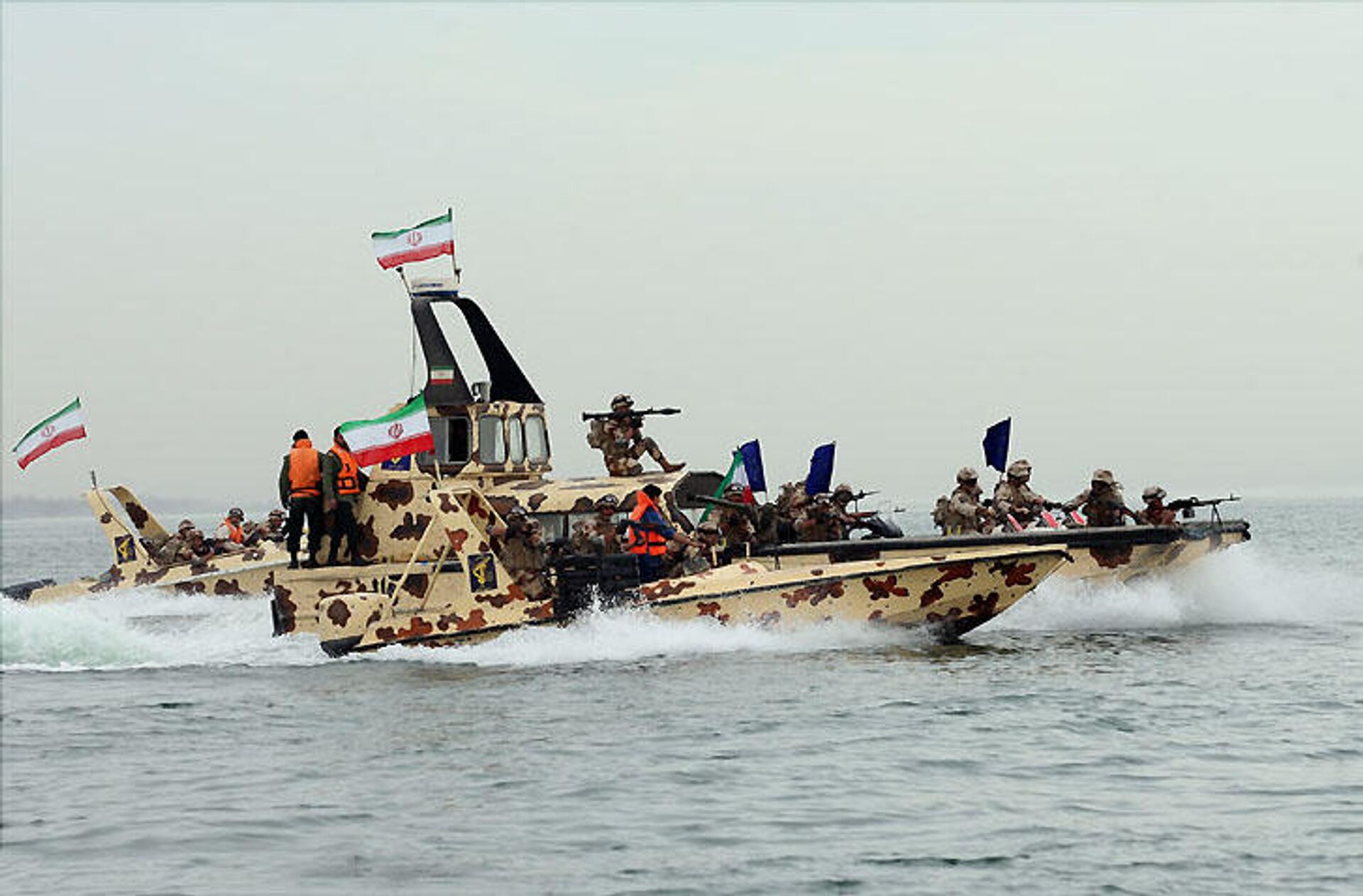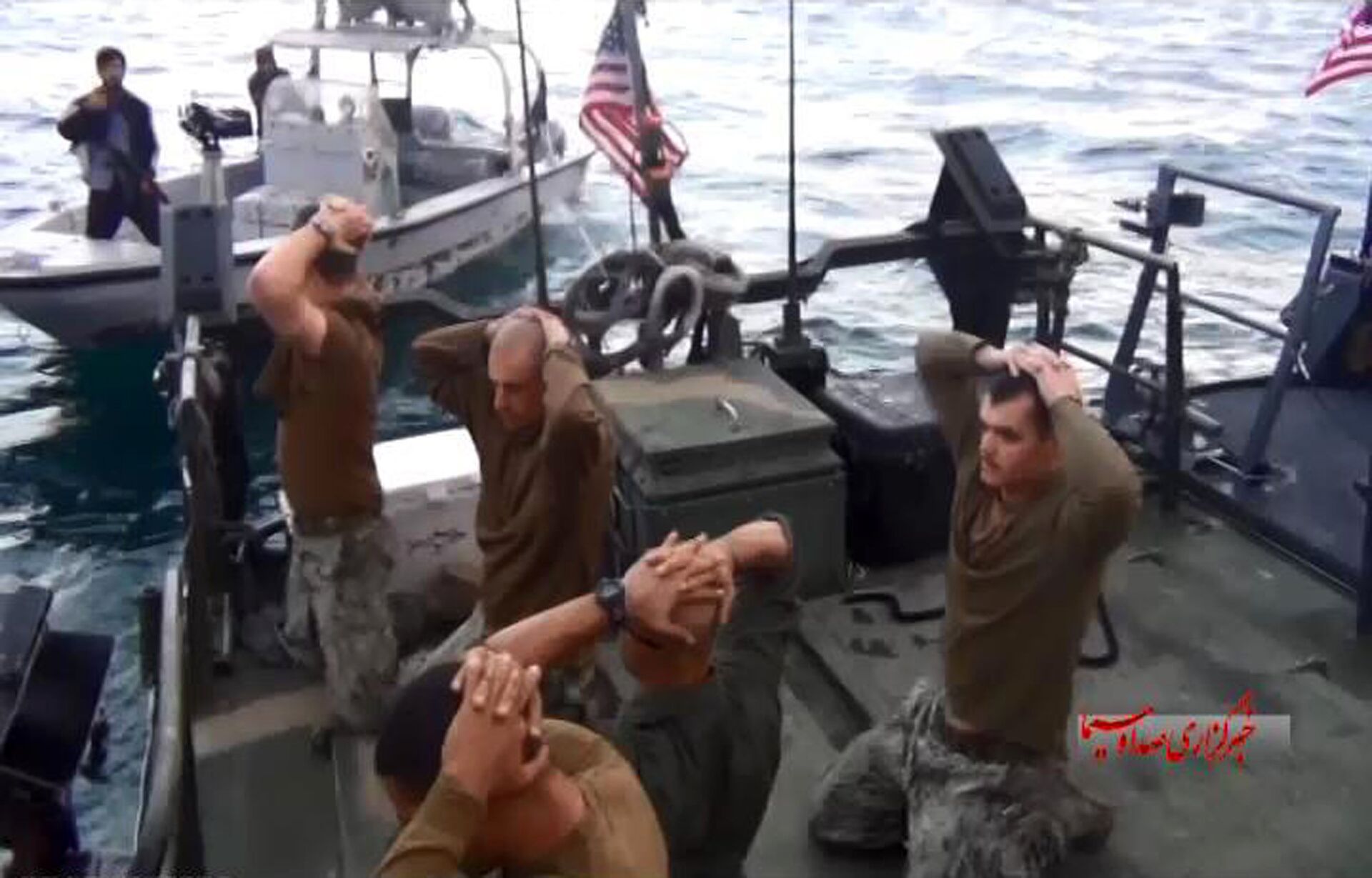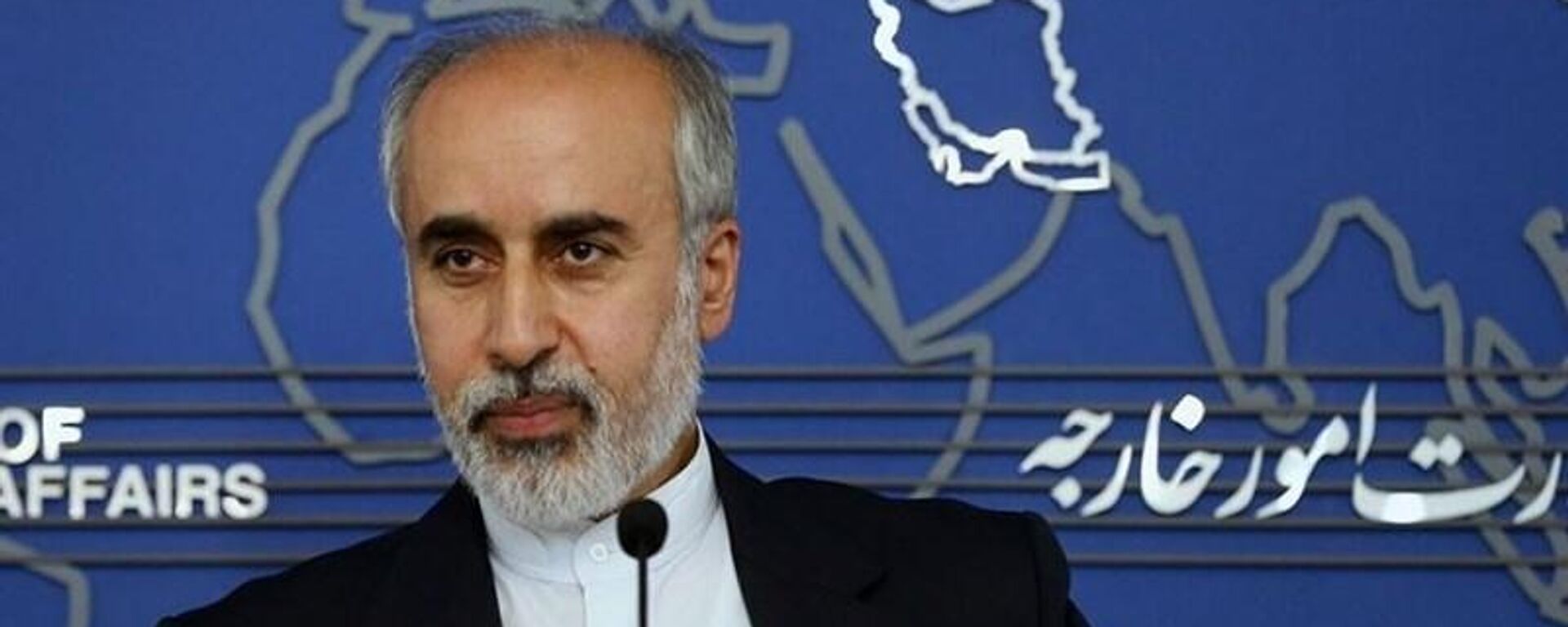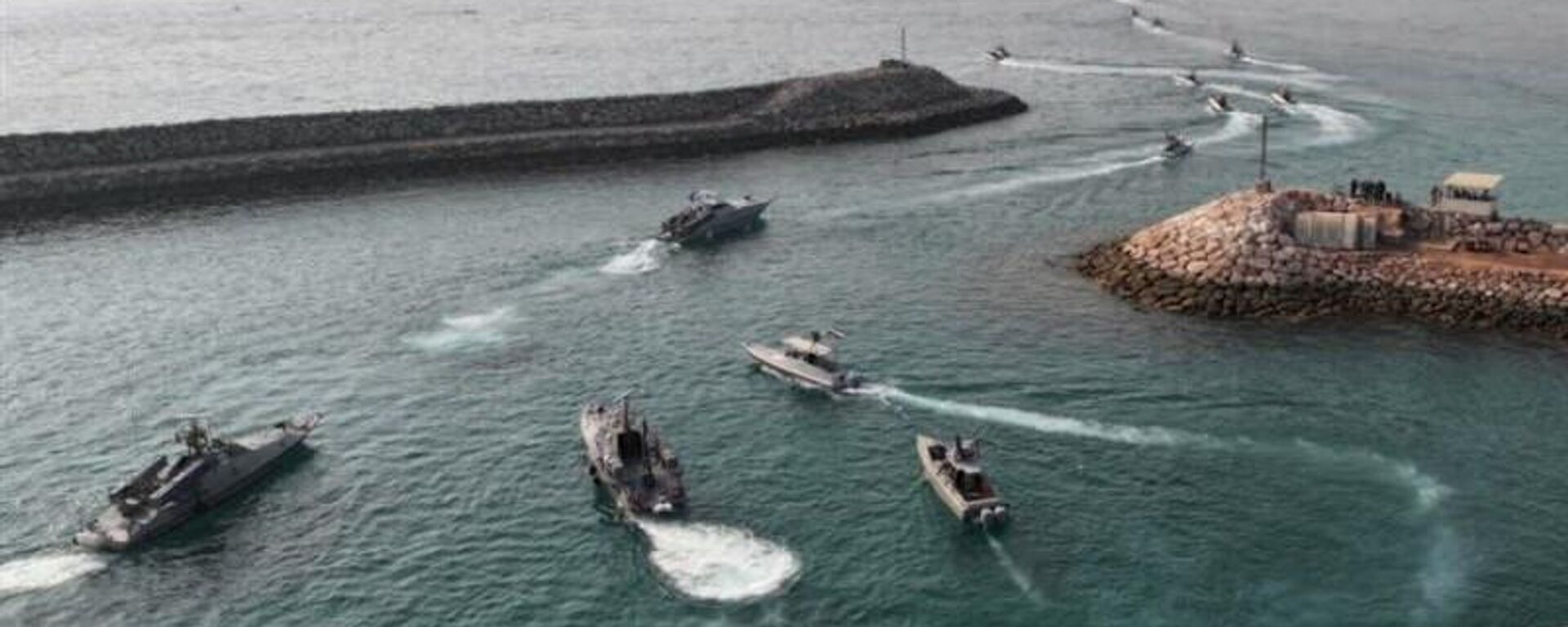https://sputnikglobe.com/20230808/us-stirs-up-waters-of-persian-gulf-escalates-tensions-with-iran-1112468227.html
US Stirs Up Waters of Persian Gulf, Escalates Tensions With Iran
US Stirs Up Waters of Persian Gulf, Escalates Tensions With Iran
Sputnik International
The US could put armed troops on commercial ships sailing through the Strait of Hormuz. The move could upset the region's security and create unnecessary risks for the US, DC scholars warn.
2023-08-08T18:45+0000
2023-08-08T18:45+0000
2023-08-08T18:45+0000
iran
strait of hormuz
persian gulf
pentagon
us navy
islamic revolutionary guard corps (irgc)
us
world
middle east
china
https://cdn1.img.sputnikglobe.com/img/07e7/08/07/1112441279_0:160:3072:1888_1920x0_80_0_0_3118df8aeeea2f1bda1426539d2b7d13.jpg
The US is beefing up its presence in the Middle East, despite earlier claims that it would scale down its involvement in the region.According to the US press, thousands of US Marines and sailors have been brought to the Persian Gulf by the USS Bataan and the USS Carter Hall. The buildup has been ongoing for several months. In March, A-10 Thunderbolt II warplanes arrived at the Al Dhafra Air Base. US F-16 and F-35 fighter jets have also been dispatched to the region as well as the USS Thomas Hudner destroyer. In May, the US, British, and French navies conducted patrols in the Strait of Hormuz, which links the Persian Gulf with the Arabian Sea and open ocean.On August 4, unnamed US officials told the press that the Pentagon was considering putting armed personnel on commercial ships traveling through the Strait of Hormuz.Why are the Strait of Hormuz and the Persian Gulf again in the focus of the US military? Washington is pointing the finger at the "resurgent" Iran, claiming that the measures are necessary to prevent the Islamic Republic from "seizing and harassing" civilian vessels. For its part, Iran resolutely denies employing such a practice.In early July, the Pentagon said that US forces had prevented an attempted seizure by the Iranian Navy of two commercial oil tankers, the Marshall Islands-flagged TRF Moss and Richmond Voyager, following through the Strait of Hormuz. Allegedly, Iranian forces opened fire at the Richmond Voyager, but had to change course after the US Navy sent the USS McFaul destroyer and MQ-9 combat drone to the scene, as per the Pentagon's story.However, the Iranian Foreign Ministry dismissed the US' reports about the Iranian Navy attempting to seize any oil tankers off the Omani shore.The Strait of Hormuz plays a crucial role for global trade. According to some estimates, roughly 88% of all oil going from the Persian Gulf passes through the strait. Tankers carry around 17 million barrels of oil daily through the strait. In other words, it's up to 30% of the world's total consumption of the commodity.The Quincy Institute for Responsible Statecraft, a DC-based US think tank, voices skepticism over Washington's plans to ensure the Strait of Hormuz's security. According to DC scholars, it's the US who aggravated tensions in the region in the first place. With different US policies, this situation could have been avoided, the think tank argues.Given that the US policy of seizing foreign oil vessels is not grounded in international law, it's hardly surprising that Tehran qualified such actions as "piracy," the report said, citing the seizure of a tanker full of Iranian oil in April by the US. This crude was then brought to Houston.The US strategy of increasing its presence in the Gulf "perpetuates US vulnerabilities," argued the think tank. First, thousands of US Marines and sailors could become a target of hostile fire, just like their counterparts in Iraq and Syria. Second, it may draw the US into new armed conflicts. Third, it could stir up regional rivalries.The decision to put the US military on commercial ships may lead to a direct confrontation between the US and Iran, warned the report. If a clash occurs involving the commercial vessel of a third party, guarded by US troops, that could mean a broader international scandal.Besides the situation described in the think tank's report, the US may face humiliation akin to a January 12, 2016 incident, when two United States Navy riverine command boats were seized by Iran's Islamic Revolutionary Guard Corps (IRGC) Navy.What's worse, the US initiative comes at a time when major regional players have taken a course on the de-escalation of tensions. The think tank referred to the fact that Iran and Saudi Arabia have recently started to mend fences with China's assistance. Relations between Iran and other Middle East powers, such as the United Arab Emirates (UAE), Kuwait, Qatar, and Oman, have also been either warming or expanding further, per the report.Under these circumstances, the US looks like a bull in a china shop, unlike Beijing, which has already received praise for its peace initiatives and positive influence on the situation in the region.
https://sputnikglobe.com/20230807/ensuring-safety-of-arabian-gulf-being-gulf-countries-job---iranian-foreign-ministry-1112447219.html
https://sputnikglobe.com/20230802/iran-deploys-warships-with-600-km-range-missiles-onboard-during-snap-gulf-drills-1112339197.html
iran
strait of hormuz
persian gulf
china
Sputnik International
feedback@sputniknews.com
+74956456601
MIA „Rossiya Segodnya“
2023
News
en_EN
Sputnik International
feedback@sputniknews.com
+74956456601
MIA „Rossiya Segodnya“
Sputnik International
feedback@sputniknews.com
+74956456601
MIA „Rossiya Segodnya“
us marines, middle east, persian gulf, strait of hormuz, oil tankers, iran seized oil tankers, us seized tankers with iran oil, uss bataan, uss carter hall, pentagon, us department of defense, jcpoa, iran nuclear deal, richmond voyager, saudi-iranian peace settlement, china, gulf kingdoms, us military buildup in persian gulf
us marines, middle east, persian gulf, strait of hormuz, oil tankers, iran seized oil tankers, us seized tankers with iran oil, uss bataan, uss carter hall, pentagon, us department of defense, jcpoa, iran nuclear deal, richmond voyager, saudi-iranian peace settlement, china, gulf kingdoms, us military buildup in persian gulf
US Stirs Up Waters of Persian Gulf, Escalates Tensions With Iran
The US could put armed troops on commercial ships sailing through the Strait of Hormuz. The move could upset the region's security and create unnecessary risks for the US, DC scholars warn.
The US is beefing up its presence in the Middle East, despite earlier claims that it would scale down its involvement in the region.
According to the US press, thousands of US Marines and sailors have been brought to the Persian Gulf by the USS Bataan and the USS Carter Hall. The buildup has been ongoing for several months. In March, A-10 Thunderbolt II warplanes arrived at the Al Dhafra Air Base. US F-16 and F-35 fighter jets have also been dispatched to the region as well as the USS Thomas Hudner destroyer. In May, the US, British, and French navies conducted patrols in the Strait of Hormuz, which links the Persian Gulf with the Arabian Sea and open ocean.
On August 4, unnamed US officials told the press that the Pentagon was considering putting armed personnel on commercial ships traveling through the Strait of Hormuz.
Why are the
Strait of Hormuz and the
Persian Gulf again in the focus of the US military? Washington is pointing the finger at the "resurgent" Iran, claiming that the measures are necessary to prevent the Islamic Republic from "seizing and harassing" civilian vessels. For its part,
Iran resolutely denies employing such a practice.
In early July, the Pentagon said that US forces had prevented an attempted seizure by the Iranian Navy of two commercial oil tankers, the Marshall Islands-flagged TRF Moss and Richmond Voyager, following through the Strait of Hormuz. Allegedly, Iranian forces opened fire at the Richmond Voyager, but had to change course after the US Navy sent the USS McFaul destroyer and MQ-9 combat drone to the scene, as per the Pentagon's story.
However, the Iranian Foreign Ministry dismissed the US' reports about the Iranian Navy attempting to seize any oil tankers off the Omani shore.
The Strait of Hormuz plays a crucial role for global trade. According to some estimates, roughly 88% of all oil going from the Persian Gulf passes through the strait. Tankers carry around 17 million barrels of oil daily through the strait. In other words, it's up to 30% of the world's total consumption of the commodity.
The Quincy Institute for Responsible Statecraft, a DC-based US think tank, voices skepticism over Washington's plans to ensure the Strait of Hormuz's security. According to DC scholars, it's the US who aggravated tensions in the region in the first place. With different US policies, this situation could have been avoided, the think tank argues.
"Iran has not intercepted shipping because Iranians have some genetic malice that compels them to do such things," the report read. "As with many other Iranian policies and actions, this practice is reactive. It was the United States, not Iran, that began the latest round of going after another nation’s tankers and seizing its oil. The US actions reflect a unilateral US policy of trying to prevent Iranian oil exports."
Given that the US policy of seizing foreign oil vessels is not grounded in international law, it's hardly surprising that Tehran qualified such actions as "piracy," the report said, citing the seizure of a tanker full of Iranian oil in April by the US. This crude was then brought to Houston.
The US strategy of increasing its presence in the Gulf "perpetuates US vulnerabilities," argued the think tank. First, thousands of US Marines and sailors could become a target of hostile fire, just like their counterparts in Iraq and Syria. Second, it may draw the US into new armed conflicts. Third, it could stir up regional rivalries.
The decision to put the US military on commercial ships may lead to a direct confrontation between the US and Iran, warned the report. If a clash occurs involving the commercial vessel of a third party, guarded by US troops, that could mean a broader international scandal.
Besides the situation described in the think tank's report, the US may face humiliation akin to a January 12, 2016 incident, when two United States Navy
riverine command boats were seized by Iran's Islamic Revolutionary Guard Corps (IRGC) Navy.
What's worse, the US initiative comes at a time when major regional players have taken a course on the de-escalation of tensions. The think tank referred to the fact that
Iran and Saudi Arabia have recently started to mend fences with China's assistance. Relations between Iran and other Middle East powers, such as the United Arab Emirates (UAE), Kuwait, Qatar, and Oman, have also been either warming or expanding further, per the report.
Under these circumstances, the US looks like a bull in a china shop, unlike Beijing, which has already received praise for its peace initiatives and positive influence on the situation in the region.
